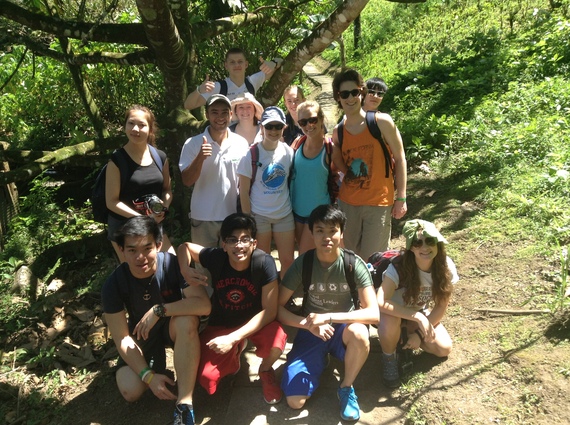By Logan Moore (OH)
Last week, I was given the opportunity to visualize the world from a different perspective. The EF Global Student Leaders Summit in San Jose, Costa Rica, featured several keynote speakers, including well-known primatologist and conservationist Dr. Jane Goodall. Everyone in attendance was deeply moved not only by Dr. Goodall's contributions to the scientific community but also by her ability to speak about life through the lens of ultimate experience. During the talk, Goodall noted, "Isn't it strange our intellect doesn't compare to the destruction we create?"
Finding motivation from her words, my peers and I made sure that we enjoyed every moment of the conference. The experience included innovative learning and problem solving during the design-thinking sessions as well as a number of unique workshops. The weekend concluded with each design-thinking team pitching their solution to an environmental problem of their choice. After the conference, we continued our ecological adventure. Encapsulated within the seemingly endless terrain of mountains and the rich culture offered by Costa Rica, we visited a fully self-sufficient farm in the Arenal region. From the creation of fresh soap to the production of micro-bacteria to maintain methane gas levels in compost bins, Rancho Margot was equipped with everything needed to be completely self-sustainable.
Broadly speaking, Rancho Margot is an example of a way that the human race can lead healthy lives without destroying our Earth. During this experience, my classmates and I learned step by step how we can enhance our communities back home as well. Our guide taught us the process by which microscopic bacteria are first created in the forest using cooked rice placed in the ground. After a day, the rice is retrieved and mixed with saw dust, liquid sucrose, and whey. Together, these ingredients form an alternative to pesticides, as well as a mixture that has the ability to contain methane gas levels to protect our atmosphere.
Awed by the exceptional usage of raw materials, I began to think about the collaboration between the workers at Rancho Margot and the teamwork I saw in each design-think group during the conference. It may seem difficult to compare 40 working adults with 500 students from around the world, but the similarity is rather striking and quite simple. When people work together, they hold an exorbitant amount of intelligence. As members of the same ranch or team, people who work side by side share a common goal. When collaboration is sought after, the possibilities for solutions are endless.
Reflecting on my time in Costa Rica, I came to the conclusion that environmental sustainability is not just putting a sheet of paper in a recycling bin. It is more than that. As Dr. Goodall highlighted, when you care for your environment, "Your heart is just as or more important than your head." From this experience I learned that truly considering the environment is when your heart and your intellect are cohesive -- working together to accomplish a communal goal. Instead of asking ourselves why our intelligence seems to be overshadowed by the damage we create, let's ask ourselves how we can make our minds stretch further than a recycling bin. Let's demand those around us work together to think globally while creating local change.
About the Global Student Leaders Summit Series
This post is part of a series produced by EF Educational Tours, in recognition of the EF Global Student Leaders Summit.
Throughout the next two weeks, you will hear from EF Student Journalism Interns detailing their experiences before, during and after the 2015 Costa Rica summit. The internship offers a way for students traveling to Costa Rica to become even more engaged with their journey and gain real-time, deadline-driven writing experience. During the summit these students will be covering stories as they unfold and sharing their experiences through their writing!
For more information on EF Educational Tours, click here.

